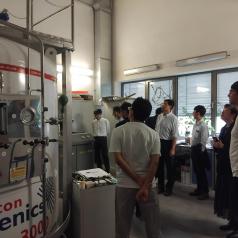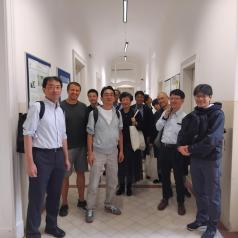From September 26th to 28th, 2024, Prague hosted the Czech-Japanese Symposium on Advanced Multiscale Materials. This event took place as part of the AMULET project, funded by the OP JAK Excellent Research Program. The primary goal of the project is the development of advanced multiscale materials, microdevices, and ion technologies with broad application potential in areas such as sensing, electronics, medicine, and environmental technologies. The symposium played a crucial role in fulfilling one of the project's objectives—fostering international collaboration.
The event was inaugurated by representatives of the two organizing institutions, Prof. Jana Kalbáčová Vejpravová (Faculty of Mathematics and Physics, Charles University) and doc. Martin Kalbáč (J. Heyrovský Institute of Physical Chemistry, Czech Academy of Sciences), who highlighted the long-standing tradition of Czech-Japanese scientific cooperation dating back to 1924. That year, Czech scientist and future Nobel laureate Jaroslav Heyrovský, in collaboration with Japanese scientist Masuzo Shikata, developed the first polarograph, a device that revolutionized electrochemistry.
"I hope that our cooperation will yield fruitful results and develop into new dimensions thanks to the AMULET project," said Prof. Jana Kalbáčová Vejpravová in her opening remarks.
Key Research Areas
Czech scientists presented their latest discoveries in the field of nanomaterials and technologies, developed within the AMULET project (Advanced Multiscale Materials for Key Enabling Technologies). Japanese scientists, in turn, showcased their research within the framework of the Science of 2.5D Dimensional Materials project. For example, Prof. Ago, head of the project at Kyushu University, delivered a fascinating talk on "Large-Scale Growth and Integration of High-Quality 2D Materials for ‘Science of 2.5D Materials’."
Laboratory Visits
The Japanese delegation had the opportunity to visit the facilities and laboratories at Charles University and J. Heyrovský Institute of Physical Chemistry. The event concluded with a productive roundtable discussion, where scientists from both countries explored future collaboration opportunities and shared ideas for further development of multiscale materials.
Czech-Japanese Collaboration in Science
The Czech-Japanese Symposium on Advanced Multiscale Materials was organized by the Faculty of Mathematics and Physics, Charles University, in collaboration with the main coordinator of the AMULET project, the J. Heyrovský Institute of Physical Chemistry of the Czech Academy of Sciences. Other partners in the AMULET project include the Faculty of Science, Charles University, the Institute of Organic Chemistry and Biochemistry of the CAS, the Faculty of Science of Jan Evangelista Purkyně University in Ústí nad Labem, the Institute of Photonics and Electronics of the CAS, the Institute of Physics of the CAS, the Nuclear Physics Institute of the CAS, and the University of Chemistry and Technology in Prague.
The Japanese delegation included researchers from prestigious universities and research institutions, such as Tokyo Metropolitan University, Tokyo Polytechnic University, Tokyo Institute of Technology, the Institute of Industrial Science of the University of Tokyo, Japan Advanced Institute of Science and Technology, Nagoya University, Osaka University, and the Institute of Advanced Energy at Kyoto University. During the symposium, participants shared the latest results of their research in advanced materials and nanotechnology.
Innovation Across Industries
The symposium fostered not only the exchange of scientific knowledge but also the promise of deepening and expanding Czech-Japanese cooperation. The AMULET project will further support this collaboration by funding research internships for Czech and Japanese scientists at institutions in both countries as part of its focus on internationalization.
This international dialogue marked another step toward developing cutting-edge technologies that could bring significant innovations to various industries in the future.






















